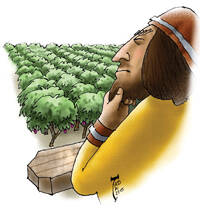Other Tenants
“What will the owner of the vineyard do?” (Mt 21:40)
• How is the Spirit leading you to greater fruitfulness?
• Pray to the Spirit for guidance in trying new kinds of leadership in your faith community.
• How do you call forth the fruitful gifts of others?
Weary of their landlessness and powerlessness, the tenants do away with all the landowner’s envoys and even his son, the heir apparent, hoping to gain control of the land themselves. Verse 40 then poses a critical question: What, then, will the owner of the vineyard do? The response is swift and brutal. Violence breeds even more violence, and the tenants will be put to a miserable death. One way in which this parable can be read is as a commentary on the futility of violence to accomplish change in ownership and leadership.
A more traditional reading of this parable is as an allegory, in which the vineyard represents Israel, the tenants are Israel’s leaders, the vineyard owner is God, the messengers are the prophets, and the son is Jesus. There are also clear allusions to a familiar parable from the prophet Isaiah, which we hear in the first reading. But there is a decided difference in the endings of the two parables. In Isaiah, when the vineyard owner is disappointed in the lack of fruit, he destroys the vineyard.
In Jesus’ parable, the vineyard is not destroyed but rather entrusted to new leaders. In both parables, a focal point is the necessity of bearing fruit and the inability of the current leadership to cultivate the desired fruit. An additional twist is that if the parable is an allegory of salvation history, the inheritance that God’s people long to claim is a free gift of the son; it cannot be wrested from the owner. If the vineyard owner is God, would the response even to the death of the son not be forbearance, loving kindness and extending one more opportunity for repentance, rather than violent destruction?
In the context of Matthew’s Gospel, the parable is aimed at the religious leaders who oppose Jesus, and it points toward the necessity of new leadership. Some interpret the “others” to whom the vineyard is entrusted as the Gentile church that “supplants” Israel. This interpretation should be firmly rejected. In the Gospel narrative, the change envisioned is from Jewish leaders who oppose Jesus to Jews who follow him. By Matthew’s time Jesus’ disciples, predominantly Jewish Christians, understood themselves as the “new tenants,” even as they struggled to define themselves in relationship to their sibling, Pharisaic Judaism.
The parable poses a searing question regarding leadership of any organization, institution or nation. If the leaders are not cultivating the fruitfulness of all members, then the leadership must be entrusted to others who will do so. Within the literary context of the Gospel, hope is held out that current leaders could repent and become fruit-bearers and cultivators of fruitfulness in others. But the parable also notes that vintage time is near—code language for the eschatological time—the moment at which time to change runs out, and the decisions made all along have a finality. The Gospel invites us to insist on having leaders who can cultivate fruitful abundance for all and to pursue nonviolent means of bringing about change in leadership when that is needed.
This article also appeared in print, under the headline “Other Tenants,” in the September 26, 2011, issue.








